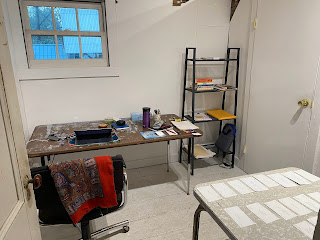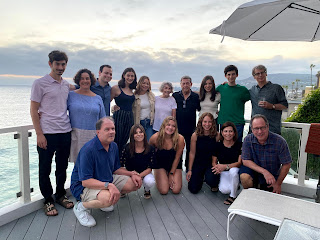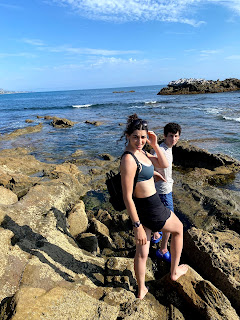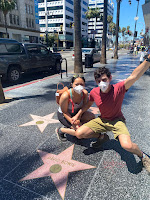 |
| Wassaic Project HQ: Maxon Mill |
I am spending November in Wassaic, New York ("Home of the First Borden Condensed Milk Factory"). Wassaic is a self-proclaimed hamlet nestled at the foot of the Taconics, a stretch of low mountains that stitch eastern New York to western Connecticut and Massachusetts. New England, effectively. I am a Winter Resident at the Wassaic Project. The place is beautiful; the whole idea is beautiful. I have 3.5 weeks to spend writing. Almost a whole month! I have a studio, a shared house, and no responsibilities to anyone other than myself. Well, I did make a plan with my housemate to cook some stir-fry veggies with rice. But otherwise, it's just me and my laptop and some index cards, the odd happy hour gathering, a yoga class, a brief presentation, studio visits...a dream come true.
I don't fully believe I got here. My original plan--to attend in October 2020--was covid-cancelled. This year, too, there were obstacles: getting the right travel documents, a negative covid test, updated car registration, leaving home. The travel documentation was a close-run thing. I knew I could cross into the US with no problem--I may be a new Canadian, but I am still an old American, with a valid passport to prove it--but getting back home to Toronto might prove problematic. Ironically, becoming a Canadian citizen last month made me a captive in the country. Part of being sworn in required that we chop up, on screen, our permanent residency cards, which had for 8 years allowed us legally to re-enter Canada. In fact one of the instructions about preparing for the event read, "Bring a strong pair of scissors." We did. Red-handled ones.
"You don't need to travel anytime soon?" asked Christine, our citizenship doula, when we joined her on-screen, nervous and eager. "It will take two to four weeks to received your citizenship certificate. Then you can apply for a passport."
"I do," I said, and explained about the residency, less than three weeks hence.
"You can postpone the ceremony, if you prefer," she offered.
No, I said. No. We had waited too long, and I could not bear the thought of standing on the sidelines watching the rest of the family become Canadian without me. Well then, said Christine, write a note along with your signed form explaining why you need to receive your certificate quickly.
I did that. I described the Wassaic Project and my heartfelt desire to be here. I could see that it did not exactly come under the heading of hardship: please, let me go away for a month to write without the distraction of home and hearth. But miraculously, my note did the trick. Perhaps that's something special about Canada, accepting that the urge to creativity can in fact be urgent. Within four days I had my certificate, with which I could request a speedy in-person passport appointment. First I had to request a phone call.
"Oh, dear, there are none available until the middle of next month," said the woman on the end of phone, worry in her voice. It was Tuesday. "Not even in Kitchener." I have been to Kitchener and had no desire to go back, but I would if it meant getting a passport quickly.
I explained to her about the writing residency. "You see, I will have almost a month to work on my project," I told her. "It's really important to me."
"Oh yes, I do see, my dear." We had achieved a 'my dear' relationship; I relaxed. "Let me send them a special request. Let's hope they will see you." I was not sure who They were, but I had confidence in my interlocutor now.
Within five minutes of hanging up, Someone More Official called and told me to bring my application to the downtown Toronto office on Thursday at 2:45. I was not being sent to Kitchener.
I rode my bike to the appointment and stood at Window Number 3. The man on the other side of the plexiglass (in the U.S. consulate it is bullet-proof glass) complimented my hummingbird backpack. He took my application and my money. "Can you come pick up your passport on Monday?" he enquired.
I told him it would be a pleasure. And it was.
Passport in hand, negative covid test achieved, car serviced and its lapsed registration updated, I headed to New York. To the Wassaic Project.
I have never 'done' a residency before, unlike most or perhaps all of my seven co-residents. I'm the oldest by far and yet the newest at this artist business. At the Wassaic Project there are no demands, plenty of space, lots of opportunities. Social intercourse without social pressure. Yesterday I toured the woodworking and metalworking shop in a big old unheated barn, full of loud scary machines. I have no intention of touching any of them, but you never know; I might write about them (especially if I take up the horror genre).
 |
| View from the barn |
A friend messaged asking if I were allowed to read during the retreat. I am. I am allowed to read, write, roam, run, ride, tack index cards right onto the walls of my studio. I have a studio. It is Number 6. The other residents here are all visual artists: painters, sculptors, workers in miscellaneous materials; I am the lone writer. I notice them wandering around the barn and the converted mill which houses the heart of the operation, fingering bits of wood and twisted wire with a strange gleam in their eyes. They seem much more at home occupying space and taking advantage of resources.
 |
| Studio Number 6 |
I am learning from them. Yesterday I commandeered a spare table on which to lay out index cards. I checked with Will, the project director, about it.
"Of course!" he replied.
He's the one who told me to stick push-pins into the walls. And I will. I just need a day or two to really get into the spirit of the thing. I had better hurry, though. There are only 20 days left.
 |
| The library |
 |
| Today's writing station: insanely warm. Have swapped sweater for sunhat. |










































